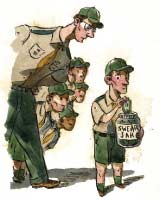
Crying Foul
Illustration by Darren Thompson
Ideas from the field: Dealing with bad language from Scouts.
- What Would You Do? in previous issues
- Share your insight - answer the current question for What Would You Do?
- Ask for advice - post your questions for What Would You Do?
Some boys in Scouter W.W.W.’s troop use crude or inappropriate language. He asked for help in redirecting these Scouts’ behavior.
 |
COUGH IT UP
We took a two-pronged approach. Prong 1 was an immediate discussion with the offending Scout regarding appropriate language. Repeated infractions would lead to further discussions, including the parents, and finally exclusion from activities. Prong 2 was the institution of a “swear jar,” requiring a donation per infraction. The contents were used to offset the cost of an end-of-year party. These methods were so effective we don’t need them anymore.
Chartered Org. Representative S.T.
Matawan, N.J.
A SCOUT IS CLEAN
Take the boys aside and have a Scoutmaster conference. Let them know this is not acceptable. Remind them that “A Scout is Clean” means more than just physically clean. You could also have a Scoutmaster’s Minute with the same theme.
Troop Committee Member S.S.
Kirkland, Ill.
SAY WHAT?
I usually let my guys know their language is offensive by saying, “Excuse me. What did you say?” The annoyed, eyebrow-raised look seems to work well, too. It may not stop them totally, but they don’t use such language in front of me again.
Troop Committee Chair P.K.
Leonardtown, Md.
A HIGHER STANDARD
I would stress that, while I cannot affect what they say and do at home or in other locations, I can affect what they say and do at a Scouting function. We, as Scouters, cannot allow Scouts to behave in a way contrary to the aims of Scouting without expecting the Scouts around the offenders to quickly adopt their behaviors.
Assistant Scoutmaster D.S.
Hinesville, Ga.
SHOW AND TELL
Consistency through example and explanation has been helpful in our unit. Over the years, our adult Scouters have worked hard to set the example in both language and action. This has filtered into the actions of our junior leaders and the troop as a whole. When a young Scout uses inappropriate language, we’ll quickly remind him that “with more than 250,000 words in the English language” he can find a more appropriate way to express himself.
Scoutmaster B.G.
Willoughby, Ohio
ATTACK THE WHY
Youths use vulgar language for the same varied reasons that some adults do. It may be for the shock effect, or it may come from the environment at home or at school or even from adult role models.
You need to address the problem at different levels. Don’t respond with shock; talk privately with the Scout at another time and explain why the language is inappropriate. Make sure that the adults in the troop are aware of the language they are using themselves. We should not expect Scouts to act differently from how they see us behave.
Anyone who uses vulgar language knows it is vulgar. It’s a choice, and they can learn to make better choices.
Skipper A.L.
Normal, Ill.
Zero Tolerance
I would excuse us both from the area but stay in eyesight. I would explain to the Scout that foul language is disrespectful to the troop and the leaders and tell him that it won’t be tolerated. There are other, more appropriate ways to get your points across.
Scouter S.D.
Warwick, R.I.
WRITE IT OUT
I have sat down with a child, one on one, and handed him a notebook. I explain that neither of us will get up from the table until he writes a three-paragraph essay in which he defines the offensive word he used, explains what he believes others hearing his language think and feel about what he said, and describes how he believes his parent or guardian would react to hearing the offensive language from him. I don’t usually have to do this with a child more than once.
Troop Committee Member S.C.
Eastpointe, Mich.
AS A ROLE MODEL …
When a Scout in our unit is heard using profane language, we remind him that he is among younger Scouts who look up to him as a leader. Swearing doesn’t make you cool or fit in; it makes you look bad and uncultured. There are better ways to express your feelings.
Assistant Scoutmaster T.S.S.
Lockport, N.Y.
CHOICE (OF) WORDS
I often remind boys that they are Scouts, and more is expected of them. Then I remind them that they should be fine having what they say and do relayed to their parents. Using profanity and crude language is a choice, even for adults. A simple test: If you don’t use certain words in front of your mom or clergyman, then you are exercising that choice. If you can do it for them, you can do it for everyone.
Scoutmaster T.W.
Woodstock, Va.
INVOLVE THE PARENTS
If I have a problem, the parents in my pack are very involved in how their boys behave. I have no problem having them intervene to correct the issue in the future
Cubmaster C.H.
Winston Salem, N.C.